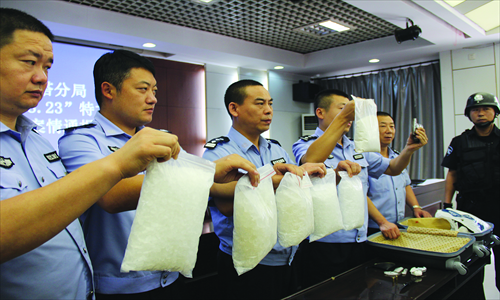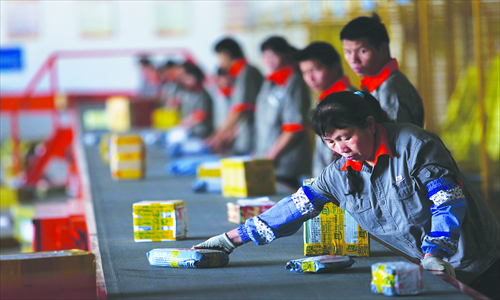Lighting up the Dark Web

Police officers display drugs confiscated in a crackdown at a press conference held in Xi'an, Shaanxi Province, on August 25. Photo: CFP
When Zeng Yuan (pseudonym), 25, from Anhui Province, was detained by police in Wuxi, Jiangsu Province, for drug abuse, she didn't know that the websites which she used to communicate with other drug users had attracted the police's attention and led to her downfall.
"After I registered on these websites, I found there were lots of drug addicts shooting up in front of their video cameras. When they asked me to join in, I accepted," Zeng said, according to a recent report by the Beijing Times.
Zeng was far from the only one to be caught in this way. Across the nation, as many as 2,120 people were arrested during a campaign targeted at online drug crimes earlier this year.
The campaign netted 268 kilograms of drugs, 7.93 tons of raw materials, 22 guns and 719 bullets across 30 provinces, autonomous regions and municipalities, as well as shutting down 11 drug making facilities, according to a statement released by the Ministry of Public Security on September 2.
Despite this success, due to the boom of web users, Chinese police admit that it is getting more difficult to track down drug crimes than before. The Internet has become a "class" for the training of drug addicts or a "market" for drug dealers to sell their wares, evidenced by a significant increase of online drug crimes in recent years, the statement said.
Hidden in the Dark Web
In comparison to normal portals, these illegal websites cannot be found on popular online engines, such as Google and Baidu. They are mostly run by those who have wide acquaintances among drug users, and only invite insiders to join to avoid police snooping.
In Western countries, these hidden websites are part of what has become known as the Dark Web, referring to networks using non-standard protocols and ports, where connections are made only between trusted peers. Just like in China, the Dark Web is also often associated with illegal activities, mostly drug trafficking as well as more horrific activities such as weapons sales or the distribution of child pornography.
According to Zeng Yuan, a Chinese online drug dealer would set up a chat group at first to attract known addicts. When more insiders, whose identities were confirmed, were brought into the group, the webmaster would post a link to a Dark Web address.
For drug addicts, those websites are easy to register on.
"I have seen one of these websites before. It was free to sign up. All I needed to do was to record myself using drugs to show them that I was one of them. If I did so, I might get permission to stay there," Wang Xiaoling (pseudonym), who was introduced to this website by a friend, told the Global Times on Friday.
He was kicked out after the webmaster found that he joined the club merely because of curiosity but didn't intend to really use drugs.
"They were very alert. Maybe they feared that I was a cop or someone like that," Wang said.
The atmosphere in these websites is always noisy, with exciting music thumping in the background. When someone enters the room, a video of a young lady taking drugs appears as a welcome screen to lure young men in.
"While older drug addicts, like those over 40, prefer using traditional drugs alone or with only a few peers, including heroin and morphine, young people, normally aged from 17 to 30, are more likely to try new chemical drugs, which give exhilarating highs. That is why people using new drugs tend to get together," Ma Zheding, director of Shanghai No.5 Compulsory Isolation and Detoxification Center, told the Global Times on Thursday, adding that the Internet has provided a convenient cyberspace to share the highs, making the Dark Web grow dramatically in recent years.
"Compared with the strong addiction of traditional drugs, which are processed by natural materials, the new chemical drugs have less addictive symptoms. They are more likely to be popular among young people," Shi Jianchun, vice deputy director of Volunteers of Beijing Narcotics Control Association, told the Global Times on Thursday.
"Despite that, the health risks caused by the new drugs is no less than what heroin causes. They can cause hallucinations and lead to severe brain damage," Shi noted.
Lack of evidence
Apart from performing drug using, many of these websites also engage in other illegal businesses as mentioned above, the official statement suggested.
However, when faced with these online crimes, police campaigns have seemed overmatched, sparking criticism from many experts.
"This phenomenon of drug crimes online has existed for several years. The actions of fighting such crimes are apparently not powerful enough," Ma told the Global Times.
His point was evidenced by the late-coming first anti-drug campaign online, which did not begin until August 2011, when 12,125 suspects were detained and 308.3 kilograms of drugs were found by police.
But police have their own issues to deal with.
"The popularity of the Internet has brought a lot of trouble to anti-drug campaigns. Those illegal websites are usually extremely well-hidden and might have a great number of members across the nation," Shi said.
In order to avoid suspicion and leave evidences, members always use codes or passwords to refer to drugs or similar objects.
Another difficulty lies in collecting evidence.
Compared to real life, when evidence of drug dealing could easily be found, online trading has enabled cyber purchases, invisible in real life.
"It is difficult for police to slip into these websites in the first place. And even if they swoop in, the video cameras, which record drug use, are usually not clear enough for police to recognize the suspects especially with smoke shrouding their faces. What's more, the transactions are all anonymous or with pseudonyms, leaving few clues behind to be tracked," said Zhang Li, a lecturer of criminology with People's Public Security University of China, told the Global Times on Friday.
Loopholes in the delivery industry has made this situation worse.
According to a report by the Beijing Times, there is no need for drug dealers to ferry the drugs themselves as they can deliver safely by private companies.
A delivery boy with the Shenzhen-based SF Express Company told the Global Times on Thursday that even though packages are sent to the transfer hub for X-ray examination, he was not sure whether all the packages were examined or not.
A regional manager of the company refused to comment on this matter to the Global Times.

Express delivery workers distribute packages in Kunming, Yunnan Province. An anti-drug education campaign was launched in the city's express industry in June, attempting to increase awareness about security checks for deliveries. Photo: CFP
According to national postal safety supervision regulations, delivery workers should examine any package given to them by a client. If the safety of the package cannot be confirmed, the client should show a safety certificate for the package issued by authorities or it cannot be delivered.
However, few express delivery companies follow the rules.
"The express delivery industry is intensely competitive. Many companies choose to simplify package examinations to attract more clients," Zhang said. He added that only those packages which must be delivered by air are all scanned with X-rays. For those transported by trains or vehicles, the rate is no higher than 10 percent, which has given a huge advantage to drug dealers.
A Beijing illegal drug seller on Taobao, who camouflages fertility drugs as chocolates to avoid investigation, told the Global Times previously that a lot of people chose to buy drugs from her knowing that they would safely reach their destination.
"The consideration between safety and profit always puts express delivery companies in a dilemma. The faster the delivery is means the higher possibility the possibility of illegal packages being sent," Zhang said, adding that these companies should be held legally accountable.
Legal loopholes
Even though online drug crimes have risen in recent years, relevant laws that target this area are still too few.
While there are explicit articles in the law to punish criminals who provide shelters for using drugs, there is none to charge website operators.
"Theoretically, Dark Web webmasters also provide cyberspace, or shelters, to accommodate drug addicts, and they should be sentenced according to the same criminal law. But there is no corresponding juristic interpretation to these articles, meaning that this punishment cannot apply to them," Zhang said.
That has resulted in these webmasters only receiving light punishment, such as fines or short detention times, allowing them to easily return to their crimes.
Zeng said that some websites provide cyber money for gambling, which must be traded for real money. In some sites, 200 yuan ($33) can buy 20 million cyber coins. Besides, webmasters can also charge money from VIPs, who pay 3,000 to 5,000 yuan to join VIP areas.
One webmaster, surnamed Guo, was quoted by CCTV as saying that the higher level a VIP attains, the more power they have such as expelling members. To keep their special status, these VIPs must pay 500 to 600 yuan every month.
According to the Beijing Times, the profit of some of these websites can reach as high as 100,000 yuan per month.
"In this case, they could be charged by the crime of running illegal websites. They could then face up to five years in prison," Zhang said.
The Internet has played a controversial role in people's lives. On the one hand, it brings down communication barriers but also has allowed illegal activities to thrive in hidden pockets of the Dark Web. While it seems that drug dealers are a step ahead of police for the moment, it is hoped that China's law enforcement agencies can catch up and quickly shine a light into the darkest corners of the Internet.